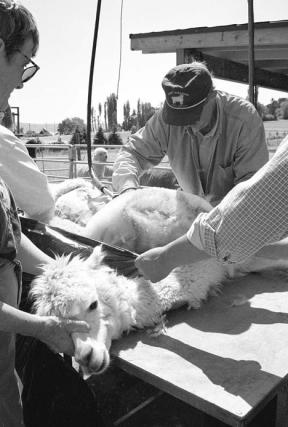Thurso was not happy, and he wanted everyone to know it.
The alpaca bleated and whined continuously as he was gently but firmly shorn of his signature shaggy coat during a shearing session on a recent Friday at Greenbank Farm.
A heard of 70 alpacas at the farm, owned by South Whidbey resident Dick Whittick, have been turning heads for months where they graze along the highway at the publicly owned farm. But lately, motorists have noticed the wooly critters from South America have been looking particularly gangly.
It’s shearing time, whether the alpacas like it or not. Whittick sheared most of his herd more than a month ago, but several other alpaca owners on Whidbey Island came to the farm July 11 to have their animals shorn by a professional shearer, Gene Jolly of Lynnwood.
Whittick plans to start an alpaca fiber processing mill at the farm. The fiber gathered at the recent shearing will be some of the first to be processed.
Thurso’s owner, Wendy Ferrier of Freeland, is a spinner and weaver, and she was excited about the prospect of a processing mill on the island.
“The mill is just what we need,” she said.
As Jolly’s air-powered shearer buzzed over the alpaca’s legs, back and belly, piles of fluffy fiber fell away. Helper Mary Kehl scooped it into black plastic trash bags marked “black,” “white,” and “mixed.”
Whittick said alpacas average five to eight pounds of fiber per animal. A larger animal has more fiber, and it is normal for the amount to lessen as they age.
Jolly started his shearing career with sheep, at a time when alpacas were something seen only in National Geographic articles on Peru.
“I’d never even seen an alpaca until four years ago,” he said.
Now he shears alpacas almost exclusively, including 300 at an event in Colorado last month.
When he started, he sheared them “sheep style,” holding them down on the ground while working as quickly as possible. He said it didn’t work too well, because alpacas are bigger than sheep, and they can end up getting hurt.
He has since invented a shearing table that is unique in the business. A normally good-natured alpaca is led to the shearing station, where a flat metal table top is tilted vertically. The alpaca stands against it while handlers strap the animal to the table, then tie ropes around the animal’s legs. The table top is then pivoted back into a flat surface and the shearing begins. It’s definitely an undignified position, but Jolly said it’s safer for the animal — and the shearer — if an alpaca is immobilized.
It takes about 30 minutes to completely shear an alpaca, right down to trimming the curly “bangs” that grow into the animal’s eyes. While they are immobilized Whittick and his helpers take the opportunity to trim hooves and file down teeth. He explained that alpacas don’t have top teeth, and the soft sweet grass they graze on at the farm is not tough enough to wear their teeth down. An electric drill with a circular sanding attachment takes care of the teeth in seconds.
Whittick had about a dozen alpacas waiting to be sheared as well, and they watched patiently from a nearby pen.
Liam, a black alpaca owned by Erin and David Chesledon of Camano Island, took the shearing a little better than Thurso. He struggled occasionally, but for the most part was patient and quiet. Afterwards he munched grass as if nothing had happened, although one had to wonder if he noticed the breeze a little more.
Erin Chesledon said she and her husband bought a pair of alpacas as companions for their horses.
“They’re all madly in love,” she said.
The Chesledons transported Liam and his pal Seamus to Greenbank Farm in the back of their Isuzu Trooper. Erin said Liam particularly enjoyed the view while sticking his head out the sunroof.
Whittick said the fiber mill will be a big draw for the farm, bringing in tourists to see the animals and tour the mill. There will also be a gift shop so people can experience the whole process, from field to finished product.
Tourists are coming even before the mill is built.
Several groups of people stopped by the open shearing station to ask questions and watch the unusual event.
Jane and Joel Scotti were visiting from Oregon, and were impressed by the operation.
“This is fantastic,” Jane. “We’ve never seen shearing before. It’s really cool.”
Other tourists stayed long enough to take a few pictures, then left.
Barn Number 2 at the farm is being remodeled as commercial and retail space, with an eye toward making it the fiber mill. Whittick is in lease negotiations with the Port of Coupeville, which owns the property. If the lease falls through, Whittick said he will set up the mill in a building he owns in Freeland.
The going rate for unprocessed fiber is around $30 per pound, Whittick said. The price goes up with processing. Fiber suitable for spinning into yarn is sold by the ounce, and goes for $40 to $50 per pound. Yarn, the most highly processed product, is sold by the ounce, but equals about $80 per pound.
Whittick thinks having a fiber processing mill at Greenbank Farm will be a win-win proposition for alpaca owners, local residents and fiber artists.
“Whidbey Island has an international reputation for fiber arts,” Whittick said. He hopes the mill will bring the artists closer to their medium.



